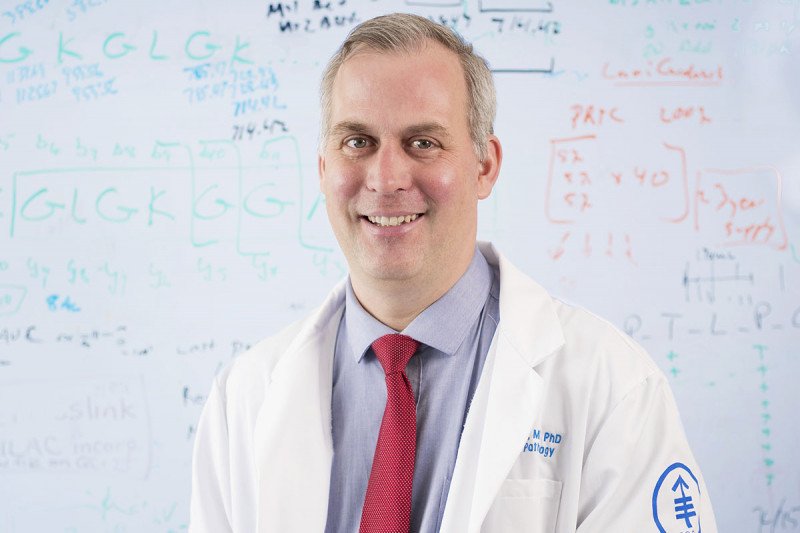Project title: Single-Cell Proteomics of Pancreatic Neuroendocrine Tumors
Michael H. Roehrl, MD, PhD Beth Israel Deaconess Medical Center

- Status: Active
- Year(s): 2021
- Grant Type: Investigator
- Research Type: Translational
- Primary Tumor Site: Pancreas
- Area of Inquiry: Cancer Proteomics
Description
Dr. Roehrl and his team will examine both primary and metastatic pancreatic NETs to determine which patients are at the highest risk for recurrence or metastases. Their study is the first to focus on detailed proteomics and single-cell proteomes of pancreatic NETs, in contrast to other research studies that have largely focused on tumor DNA and RNA.
What question will the researchers try to answer?
Pancreatic neuroendocrine tumors (PanNETs) are rare, relatively slow growing but deadly tumors that frequently metastasize to lymph nodes and the liver. A major question with great relevance is why many patients experience recurrences after the surgical removal of the primary tumor, develop distant metastases, and die from the disease. A precise prediction of favorable vs. unfavorable behavior of a tumor is currently not available but is highly desirable to optimally tailor individual treatment intensity and improve patient survival.
PanNETs are molecularly heterogeneous and composed of different subtypes that are currently indistinguishable by today’s diagnostics (such as tissue histology or gene sequencing). Follow-up monitoring after surgical resection is mostly based on radiographic imaging alone. There are no curative therapies once metastases occur, no markers of early detection and metastatic risk, and no established molecular means of patient surveillance. There is therefore an urgent need for novel molecular markers for PanNET differentiation. A proteomic approach to PanNETs is novel and promising.
What will researchers do?
Dr. Roehrl will be the first to focus on detailed proteomics and single-cell proteomes of PanNETs, in contrast to prior work that has largely focused on DNA and RNA in tumors. He and his team will examine both primary and metastatic tumors to discover which patients may be at high risk for recurrence or metastases. They will use deep, unbiased mass spectrometry proteomics to identify protein pathways and proteomic patterns that characterize new PanNET subtypes and distinguish low-risk from high-risk PanNETs.
How might this improve the treatment of NETs?
The results from Dr. Roehrl’s research are expected to have a direct impact on better clinical management of cancer patients, as those who have a high risk of metastasis would be followed more closely and treated with more intense medical therapy well before metastases appear. Their results will help uncover how deadly metastases differ from primary tumors and how proteomic heterogeneity can be used to design more effective and metastasis-specific drugs.
What is the next step?
He and his team hope to rapidly move the promising protein markers from this project into clinical diagnostics and future therapies to directly benefit all patients who have neuroendocrine tumors.
Additional Details
- City: Boston
- State: Massachusetts
- Country: USA
- Grant Duration: 2 years
DISCLAIMER
NETRF funds laboratory research to understand the development of neuroendocrine tumors and translational research to explore new concepts in treatment. Research grant descriptions and research updates from NETRF are not intended to serve as medical advice. It can take years for research discoveries to be fully validated and approved for patient care. Always consult your health care providers about your treatment options.
